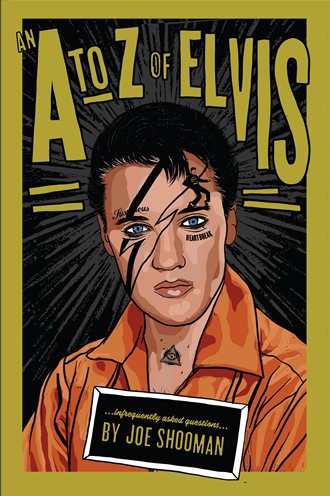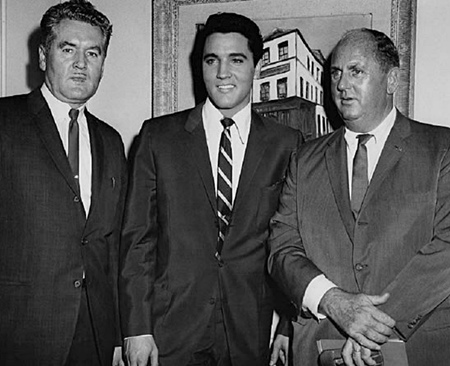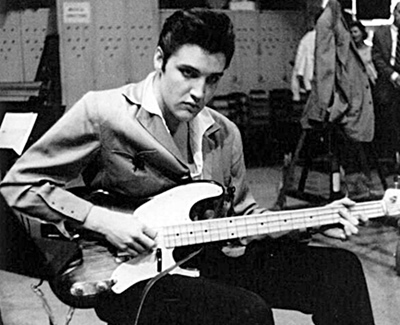Interview - Joe Shooman .... author of 'An A-Z of Elvis: Infrequently Asked Questions'
Earlier this month, EIN’s Nigel Patterson posed a number of questions to Joe Shooman about his very interesting, and quite offbeat book, An A-Z of Elvis: Infrequently Asked Questions.
EIN: Who is Joe Shooman?
JS: Born in Wales, lived in various places, written for a living for two decades, plays music for his own pleasure these days but previously as a bassist in various bands touring the UK and bits of Europe. Part-time rock and roll librarian. Relatively healthy, has own teeth, two cats, a wife and a mortgage. :)
EIN: Joe, you are a prolific author. For those EIN readers not familiar with your other books, could you please tell us about some of them?
JS: Of course - I've been a journalist for 20 years, working in music, entertainments, sports, news, broadcasting, travel and more. As you go along that road you tend to meet a lot of people as you know! It so happened that in 2006, out of the blue, I got asked to step in and do a book on the band Trivium. The original author for some reason could no longer do the project. Luckily for me, it was also World Cup year in football so apparently a couple of other authors were unavailable cause of that, and another one was having a baby... so I ended up doing it! It went well, and since then I've written biographies of Kasabian, Blink-182, All Time Low, and others. My biography of Bruce Dickinson of Iron Maiden has done really well and been published in loads of different languages, and I did an Iron Maiden book a couple of years ago which had tons of interviews in it - most of the ex-members, in fact. Outside of music, I did a study of MySpace (remember that?) in 2007 and last year had a lot of success with Would You Rather?. That's a collection of questions and dilemmas that you play around the dinner table, for example: would you rather play a 10-foot guitar, or a 10-inch guitar? Silly, but fun. It was a bestseller of sorts in the UK over Xmas 2020.
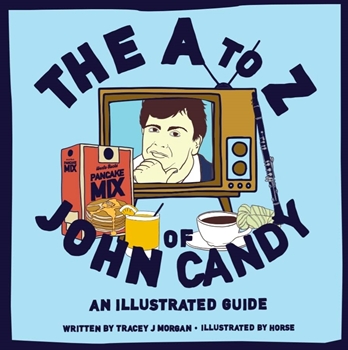 |
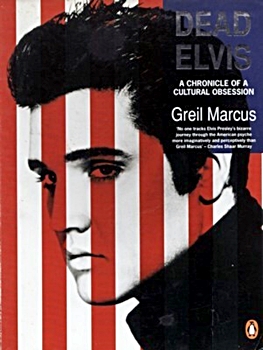 |
EIN: How did the idea for an offbeat Elvis book come about?
JS: Basically, there was no point doing an Elvis book unless it had a different angle, or a different vibe about it. Me and Tracey at the publishers have been discussing doing something together for years. In fact, we knew each other from various bands and club nights she was managing and promoting, and I was writing about, back in the early 2000s. Tracey had previously published an A to Z of John Candy, which is a brilliant book with the same designer/illustrator, Gary McGarvey aka Horse. I edited that, as I did with her John Candy biography that had come out the year before. And, so, it all converged on the notion that Elvis was, is and always will be a culturally-significant force. And that there was room for a book that looked at it from a kind of pop-culture angle, with tongue-in-cheek sometimes but always respectful. Once we decided on that, it was all systems go. I always liked the idea of Greil Marcus' Dead Elvis, which was an indirect inspiration I think.
EIN: There are several common themes running through An A-Z of Elvis – family and heritage, biographical information, conspiracy theories, and Elvis’ socio-cultural impact. Were these themes deliberate or did they just naturally evolve from the information you collected?
JS: This is a fascinating question and one I ask myself after having written the book! I think inevitably, these themes arise of their own volition. It's very pleasing that within an A to Z there can be scope for that kind of narrative growth. In one sense, it's similar to writing a novel, in that very soon after I began researching and writing it, the work kind of took on a personality of its own. And, of course, the themes you mention are the ones I find very interesting personally, and I hope others do too.
EIN: What was your strategy in researching such a diverse collection of entries for the book?
JS: Blindly stumbling around the Internet, books and other sources, bumping into random things that I thought were either relatively unknown facts, or strange enough to be included, or plausible enough to be possibly true, albeit maybe in a different universe. You can start anywhere with Elvis, but where you end up is out of your control!
EIN: What were your favorite discoveries in researching the book?
JS: I already kind of knew the story of Tommy Steele taking Elvis on a sightseeing tour of London, but I didn't really ever get into it with any kind of fidelity until I did the book. I love the idea that two young musicians effectively played Hookey from school and went out around London having fun, taking pictures, waving at the Queen and eating fish and chips. I would love that to be true. And, you know what: if this isn't made into a movie in the next decade I will eat Queenie Waheenie's Papaya.
From the archives - New Musical Express, April 24, 2008:
British entertainer Tommy Steele has confirmed that he did take Elvis Presley on a trip around London in 1958. It was previously reported by a cohort of Steele‘s, Bill Kenwright, that Presley visited England, despite it being generally thought that he never visited the country in his lifetime. Steele confirmed that the trip did occur, but said he regrets the news leaking to the press. In a note to the Daily Mail Steele said he “swore never to divulge publicly” what happened.
“I can only hope he [Presley] can forgive me,” he wrote. It was an event shared by two young men sharing the same love of their music and the same thrill of achieving something unimaginable.”
EIN: Joe, social media was an important element in your research, particularly regarding some of the more “out there” claims. Did you submerge yourself in any of the Elvis social media groups conspiracy and if you did, how did you find that experience?
JS: Maybe not submerge as such, but definitely a snorkel in those deep waters. You can very easily get tangled up in the weeds of conspiracies on social media, and never make your way back out again. I had to keep reminding myself that the A-Z wasn't the place for granulated detail of hour-by-hour reconstructions of each Elvis Day, before 1977 or afterwards. So I was aware always of not letting myself be sucked in too much. I am not sure if I succeeded!
EIN: Some of the strangest and most confronting inclusions in An A-Z of Elvis include Vernon Presley not being Elvis’ biological father, and Elvis having more “brothers” than just Jesse Garon. Did you form any views about these claims and the people who promote and/or believe them?
JS: They really are quite confrontational aren't they? If any of these theories or claims turned out to be true it would shock the world and turn the whole story upside down. I have personal views on the veracity of these claims, but the book remains mostly neutral. An A to Z of Elvis is there to present these stories, and shed light on them where possible, but it's absolutely up to the reader to decide if they want to dig deeper and obviously also up to the reader what they choose to believe. I'm a journalist above all so I tend to dwell on things that are factual, but as a fan of Elvis I am also drawn toward the rich and wonderful theories that abound in pop culture. And there is part of me that does wish Elvis actually made it through and is happy being a preacher in a small church somewhere.
EIN: Did you get to see/read the elusive and rather mysterious Presley (Commission) Report?
JS: I tried, I tried, I tried. But the answer is no. I wonder if anyone's ever seen it, and indeed, whether such a thing does actually exist. Alongside every other Elvis fan, I would love to read it. But as with all other Elvis fans, I doubt I ever will. It is interesting to me that nearly all the Commission members have written books about Elvis being alive and so on. Without being too cynical, I suspect the Colonel himself would be proud of the PR that it's generated. Hucksterism, sleight of hand, hints and rumours can really get people through that circus tent flap can't they?
EIN Note: The Presley Report does exist – here are three extracts from the elusive 312 page report:
P R E F A C E
The controversy surrounding the "reported" death of America's Favorite Son, Elvis Aron Presley has bewildered many since its inception. A very large cross section of the public representing interests from his music to the concerns for his safety and welfare, have prevailed in the inquisition of this case.
This report was compiled to provide the information that surfaced during the course of this investigation, to review and examine the events of August 16, 1977.
The major issues addressed here were intensively analyzed and debated, and in many cases classified by the identification of known variables to present the disposition of Mr. Presley's activities before and after the summer of 1977.
The professional individuals who were asked to serve on this Commission have done so out of their mutual respect for Elvis. Their participation in this learning process has provided history with a unique opportunity. There is a great deal to learn about the man known as Elvis Presley, this great American, one with more love in his heart than many could ever begin to imagine.
The journey was a bit rough at times, but what in life isn't? When the learning process has progressed, and the "dust" has settled, we must not lose faith or, our desire to learn more. "There isn't any way you can stop learning"
... Elvis Presley, 1981
............................................
Organization of the Study
The findings of this commission are divided into ten case files.
A preliminary section provides the introduction and discussions for the logistical implications and the reasons to conduct this study.
A. PREFACE
B. INTRODUCTION
C. DESIGN & METHODOLOGY
D. COMMENTARY/NARRATIVE
E. CASE FILES-10
F. DISPOSITION SUMMARY
SECTION III DESIGN AND METHODOLOGY
Purpose of the Study
Through an evaluation process, this Commission analyzed the importance of the evidence supporting reports of activities, developing intelligence on matters concerning the subject, Elvis Aron Presley. The evaluation process focused specifically on investigative research conducted by the consultants of The Presley Commission, as well as an analytical review of testimonies given. The effectiveness and impact of these findings on our Society were estimated utilizing quantitative and qualitative data gathered from published sources, interviews, and the analysis of documents.
Focus of the Study
Because the primary activity of The Presley Commission involves investigative development of intelligence information and sources, this aspect as it relates to the activities surrounding the reported death of Elvis Presley were analytically examined. The stakeholders included in this process were approached, and in some cases named on a list of individuals knowledgeable of certain facts concerning events that occurred prior to August 16, 1977, and thereafter.
Study Variables
There were five variables examined through the use of surveys, interviews, and records analysis. They were: 1) Organization, 2) Communication, 3) Planning, 4) Implementation, and 5) Evaluation. Each variable was implemented in relation to staff development and qualifications. The variables were identified and determined through a review of literature and recommendations from sources, all consisting of the ranks of an Advisory Council, private sources, medical professionals and law enforcement personnel.
............................................
ELVIS A. PRESLEY
COMMISSION NARRATIVE
PUBLIC SERVICE APPOINTMENTS
In the review of further information regarding the many badges and honors that had been bestowed upon Elvis Presley during his career as a premier entertainer, indicates much more than him being recognized for financial contributions, or for the purpose of maintaining a "collection" of badges for personal reasons.
Mr. Presley provided a job cover for an agent of the United States Government, allowing the assigning agency to conduct a very successful investigation into illegal firearms. As a result, Elvis was awarded a certificate by the ATF for his efforts to assist. In 1971, he was awarded the honor of "one of the ten most outstanding young men in America" for that year, by the Jaycees in Memphis. This was primarily for his contributions in "drug" enforcement. One author stated most accurately when she said, "Elvis was a Federal Agent, there is no doubt about it"!
In addition to the list of badges that are shown on the next 4 pages, it is also known that Elvis had completed training with the Royal Canadian Mounted Police, and that he also had developed an involvement with the Berlin Police, as well as Scotland Yard. The activities surrounding these appointments directly involved the structure for what Elvis would be doing at a later time, when he was able to execute important changes in his life.
The appointments that are listed in this report assisted the Commission in determining the "link" or connection to certain cases that Mr. Presley was able to assist with, based on the appointment list, in a cross comparison. For example, The involvement of the subject to assist in "Orange Delta Two" would be cross referenced with Elvis being a Captain of the Louisiana State Police, which would give him jurisdiction in the state, and his Federal badge would give him jurisdiction on an interstate basis. His involvement in the affairs of Shelby County, Tennessee as well as his Captain's badge with the Tennessee Highway Patrol, would also provide the jurisdictive power to assist in cases within those actual jurisdictions.
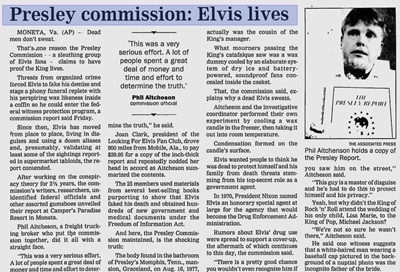 |
EIN: After writing An A-Z of Elvis, has the experience changed the way you think about Elvis?
JS: It has reiterated how much I love the music, and that is what is absolutely at the heart of everything. And from that cultural point of view, it's enhanced my horizons in terms of the continuing impact of The Memphis Flash. What a story. What a singer. Awesome.
EIN: It seems to me, you could easily write more volumes about the more unusual things in the Elvis story. Do you have any plans for another Elvis related book?
JS: I think the conversation between Elvis and the world is ongoing, and there will always be great interest in anything that brings a new angle to it. I don't plan to write another book on Elvis, unless it seems that there's an irresistible story that hasn't yet been told. I've never taken on a book unless I've felt I could add to the story, or correct some myths, and so on. A sequel to this has been suggested a couple of times, but generally I think I've done what we envisaged at the start and produced something that looks great, has interesting entries, is fun, snappy and a little bit anarchic. I'm not sure if the energy would be the same with another volume. That said, I'd love to write the screenplay for "Elvis and Tommy Take London" (laughing)
EIN: What is next for Joe Shooman?
JS: We're reopening the libraries here in the UK in a couple of weeks, as Covid restrictions ease, so I'll be really busy with that. I have some book editing jobs coming up, lots of writing for Bass Player Magazine, and there is a possible new book on the table for the summer, which will develop over the next couple of months. It's not a music book. Aside from that I am in the process of negotiating my way to the right agent for my fiction and kids' book stuff. And planning another trip to Memphis in a year or two - I've got friends there who know all the best spots for crawfish!!
EIN: Joe, is there anything else you would like to say to EIN readers?
JS: EIN is a brilliant site and I certainly read absolutely loads of stuff on here whilst researching and also before that for my own pleasure. We're lucky to have you guys producing such amazing content that keeps the legend of Elvis alive. I am so happy that there has been such interest in my book, both as an author and as a fan of Elvis Presley. Keep the faith! And listen to the music!
EIN: Joe, thank you very much for talking with EIN today. It is appreciated.
Review by Nigel Patterson.
-Copyright EIN April 2021
EIN Website content © Copyright the Elvis Information Network.
EIN has the largest, most varied collection of ELVIS books that have ever been published.
Nigel Patterson is the world's major authority on Elvis publications and reviews books that no other website even consider.. |
Book Review 'An A-Z of Elvis': Joe Shooman’s new book 'An A-Z of Elvis... Infrequently Asked Questions' is an offbeat look at various parts of the Elvis story.
As the author notes, "This isn’t your bog-standard rehash of the same old Elvis tropes, instead we decided to look for the weird and wonderful…"
The A-Z entries are a diverse, eclectic collection, from the well-known to the weird and controversial. Each entry is afforded a paragraph or two up to a page of interesting text, with many of the entries complemented by impressive contemporary, hand drawn, artwork.
Our review discovers that at times, there is an almost punk sensibility in the narrative as author Joe Shooman dredges the darkest recesses of the multi-layered Elvis story and occasionally assaults the reader’s conception of Elvis Presley reality....
Go here as EIN's Nigel Patterson checks out this fascinating sounding publication.
(Book Reviews, Source;ElvisInformationNetwork) |
 |
Book Review - 'ELVIS UK3': Recently published 'ELVIS UK3' The Ultimate Guide to Elvis Presley's British CD Releases 1983-2005' by John Townson and Gordon Minto comprises 1400 pages with over a million words plus 4,000 plus illustrations.
This examination of Elvis’ British releases is an incredibly detailed narrative and visual record of his CD releases in the UK from 1983 to 2005. The first Elvis CD, 'The Legend' (3CD), was released in the UK in December 1983. Reflecting the fledgling nature of the format, UK fans had to wait another 12 months until the release of not one, but three, Elvis albums, in December 1984. By that time, the flood gates for the CD medium were starting to strain.
As with the authors’ earlier two volumes on Elvis UK vinyl releases, the information in Elvis UK3 is exhaustive.
To say that Elvis UK3 was well-researched would be a serious understatement. There is so much information in this book that it is difficult to comprehensively review it all. While many collectors will be most interested in the technical details for each entry, the author’s narrative is excellent.
Released using the flipbook format EIN tested Elvis UK3 on four platforms - a 28” computer monitor, 14” tablet, iPad 8 and a 6.5” android mobile phone.
EIN's Nigel Patterson has spent plenty of time reading through this massive work and here presents his in-depth review ...
(Book Review, Source;ElvisInformationNetwork)
|
 |
Book Review – 'Elvis 1956 July 5 to July 31 (Memphis-Biloxi-New Orleans)': Paul Belard’s latest photobook is another strong release. Focusing on a month in 1956 when Elvis actually got to take vacation.
Starting on July 5, 1956 (the day after Elvis’ triumphant concert at Russwood Park in Memphis - this will be covered in another volume), the hundreds of photos (many candid shots) show a different side to Elvis than normally associated with books about Elvis during the height of Presleymania.
.. July 1956, Elvis days off were spent deep sea fishing and relaxing before Elvis returned to Memphis on the 20th, where photographer, Lloyd Shearer, was on hand to take a slew of photos of Elvis around the city. At the end of the month Elvis returned to Biloxi....
The images are nicely complemented by a diverse and fascinating collection of archival materials.
Go here to read EIN’s detailed review from Nigel Patterson
(Book Review, Source: ElvisInformationNetwork) |
 |
(Book Review) The Jewish World of Elvis Presley (Roselle Kline Chartock): The latest Elvis related book by an academic draws attention to an issue many fans will have been unaware of – the strong affinity Elvis had with Jews and how it influenced his life. Jews were disproportionately represented in Elvis’ life and inner circle – for instance, five of the Memphis Mafia were Jews. Was it just coincidence that there were so many Jews in Elvis’ life or was there something more at work?
Roselle Kline Chartock (Professor Emerita of Education) has written an absorbing and accessible account of the importance of Jews in Elvis’ life from his Jewish roots to the many personal friendships and professional relationships he enjoyed with them.
In so doing, the author reveals that what has previously been seen as a series of anecdotes, is actually a coherent and important theme in the Elvis story.
Read Nigel Patterson’s detailed review
(Book Reviews, Source;ElvisInfomationNetwork)
|
.
|
(Book Review): Kid of the King (Liz Presley): The world knows Lisa Marie Presley to be the only child of Elvis and Priscilla. In this new book, Liz Presley claims to be the “older sibling” of Lisa Marie - a claim that will be met with derision and disbelief by most fans.
EIN’s Nigel Patterson offers his views on Ms Presley’s claim and the author’s wider story which traverses her struggles with gender identity (Liz was born ‘David’), a troubled upbringing, becoming successful in business, fulfilling her dream to be a singer, and, most importantly, finding “herself” and her “real family”. Regardless of what readers think of the author’s claim, EIN’s Nigel Patterson found that there is an important message reflected in Kid of the King.
Read Nigel’s detailed review
(Book Review, Source: ElvisInformationNetwork) |
.
|
(Book Review) Elvis@Argentina 1963-1969 (Carlos Ares): The second volume in Carlos Ares’ series of “coffee table” books detailing Elvis’ reception in Argentina is another high quality production. With a great balance between informative text, colorful images and impressive archival artefacts, it is a worthy inclusion in any fan’s Elvis library.
It is available in English and Spanish text editions.
Read EIN Nigel Patterson’s detailed review
(Book Review, Source:ElvisInfoNetwork) |
 |
(Book Review) Destined to Die Young (Sally Hoedel): Could Elvis’ death at the young age of 42 have been avoided? This question is answered in Sally Hoedel’s thought provoking book, Destined to Die Young.
The book is the result of exhaustive research by the author who found a key factor which was to affect Elvis throughout his life – one which meant that regardless of his diet and overuse of prescription medication, he was destined to die young. The narrative is full and colorful, and its depth of detail reflects the extent of research undertaken by the author.
In her introduction, the author establishes an important context for Elvis’ longevity (or lack of longevity) and health issues, this being his family tree.... Hoedel identifies the genetic disorder as Antitrypsin Deficiency, a condition which can result in lung and/or liver disease. In this respect, her discussion of the life and death of Gladys Presley is thought provoking..
Go here to read EIN Nigel Patterson's detailed review
(Book Review. Source: ElvisInformationNetwork) |
 |
(Book Review) From Elvis in Memphis (Eric Wolfson): The 150th volume in the popular Bloomsbury Academic 33 1/3 series of music history and criticism books is Eric Wolfson’s From Elvis in Memphis (due out on 12 November).
EIN’s Nigel Patterson recently sat down and submerged himself in what is the first (and long overdue) extensive examination of any Elvis album.
What Nigel found was a deeply considered, strongly written, and thought provoking analysis of what many regard as Elvis’ finest album.
.. "In 1968, Elvis Presley was worse than dead – he was irrelevant. After helping to establish rock and roll as a cultural force and becoming its biggest star in the 1950s, he now found himself eclipsed by the music. New artists like the Beatles and Bob Dylan blew the mid-1960’s rock landscape wide open.. Elvis, once the epitome of the young and exciting rock and roll star, had become old and stale.
From the moment that From Elvis in Memphis begins with a rock and roll Odysseus returning home after “a little while”, the album refuses to settle. Over the course of the record, people drive eight-wheel locomotives, ride in long black limousines, and soar like beautiful birds...."
Read Nigel’s detailed 3,000+ words review of From Elvis in Memphis
(Book Review, Source:ElvisInformationNetwork) |
 |




